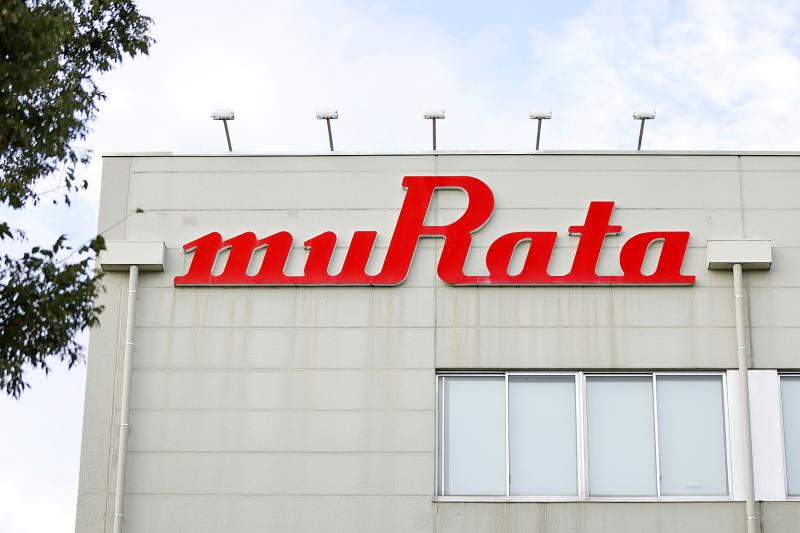Multilayer ceramic capacitor (MLCC) manufacturer Murata Manufacturing Co’s decision to suspend some production lines at a key plant in Japan to fight a COVID-19 cluster infection there could lead to order transfers for high-end products, but the short-term revenue benefits for Taiwanese firms would be limited, Capital Investment Management Corp (群益投顧) said yesterday.
“We believe that the effect of order transfers remains to be seen, as the first quarter is a low season for consumer passive components in the Greater China region and the demand is weak,” Capital Investment wrote in a note.
“However, the demand for high-end products used in automotive and industrial control applications is still good, and there is a possibility of order transfers,” it said.

Photo: Bloomberg
Murata, the world’s largest supplier of MLCCs, which are used in smartphones, computers, vehicles and other consumer electronics, on Saturday confirmed that several employees at Fukui Murata Manufacturing Co’s Takefu factory in Echizen city had tested positive for COVID-19, the Nikkei Shimbun and Kyodo News reported.
The firm has suspended some operations at the Takefu factory, as more than 100 COVID-19 cases have been confirmed and about 1,200 of the factory’s 7,000 workers are quarantined, the reports said.
During the last cluster infection at the Takefu factory in August last year, all production lines were suspended.
Taipei-based TrendForce Corp (集邦科技) said in a report yesterday that only some categories of production capacity have been reduced or suspended at the Takefu factory.
The Takefu factory accounts for 20.7 percent of the company’s production capacity, which mainly focuses on high-end consumer MLCCs, TrendForce said.
“The current production reduction or suspension of some items will affect the supply of products such as servers and high-end smartphones,” it said in the report. “Fortunately, Fukui Takefu still retains 4 to 6 weeks of inventory and this incident should not tighten market supply in the short term.”
As soon as the Murata news broke, there was speculation that Yageo Corp (國巨), the world’s third-largest MLCC supplier, Walsin Technology Corp (華新科技) and other Taiwanese passive component suppliers might benefit from order transfers, as it is not known when the Takefu factory will resume full operations.
However, based on past MLCC factory lockdowns in Southeast Asia amid the COVID-19 pandemic, order transfers had not been obvious, Capital Investment said.
“While Yageo’s high-end product line is expected to benefit from any potential order transfers, the revenue effect would be limited in the short term, as the company’s current delivery time of high-end products for automotive and industrial control products is above six months,” Capital Investment said.
Yageo reported consolidated revenue of NT$106.54 billion (US$3.86 billion) for last year, up 57.49 percent from NT$67.65 billion in 2020, while Walsin’s revenue totaled NT$42.09 billion last year, an increase of 18.41 percent from NT$35.54 billion a year earlier, company data showed last week.
Yageo shares yesterday rose as much as 3.19 percent in Taipei trading, before paring gains to close 0.2 percent higher at NT$502, Taiwan Stock Exchange data showed.
Walsin shares closed 0.32 percent higher at NT$157.5, off a high of NT$163.

MULTIFACETED: A task force has analyzed possible scenarios and created responses to assist domestic industries in dealing with US tariffs, the economics minister said The Executive Yuan is tomorrow to announce countermeasures to US President Donald Trump’s planned reciprocal tariffs, although the details of the plan would not be made public until Monday next week, Minister of Economic Affairs J.W. Kuo (郭智輝) said yesterday. The Cabinet established an economic and trade task force in November last year to deal with US trade and tariff related issues, Kuo told reporters outside the legislature in Taipei. The task force has been analyzing and evaluating all kinds of scenarios to identify suitable responses and determine how best to assist domestic industries in managing the effects of Trump’s tariffs, he

TIGHT-LIPPED: UMC said it had no merger plans at the moment, after Nikkei Asia reported that the firm and GlobalFoundries were considering restarting merger talks United Microelectronics Corp (UMC, 聯電), the world’s No. 4 contract chipmaker, yesterday launched a new US$5 billion 12-inch chip factory in Singapore as part of its latest effort to diversify its manufacturing footprint amid growing geopolitical risks. The new factory, adjacent to UMC’s existing Singapore fab in the Pasir Res Wafer Fab Park, is scheduled to enter volume production next year, utilizing mature 22-nanometer and 28-nanometer process technologies, UMC said in a statement. The company plans to invest US$5 billion during the first phase of the new fab, which would have an installed capacity of 30,000 12-inch wafers per month, it said. The

Taiwan’s official purchasing managers’ index (PMI) last month rose 0.2 percentage points to 54.2, in a second consecutive month of expansion, thanks to front-loading demand intended to avoid potential US tariff hikes, the Chung-Hua Institution for Economic Research (CIER, 中華經濟研究院) said yesterday. While short-term demand appeared robust, uncertainties rose due to US President Donald Trump’s unpredictable trade policy, CIER president Lien Hsien-ming (連賢明) told a news conference in Taipei. Taiwan’s economy this year would be characterized by high-level fluctuations and the volatility would be wilder than most expect, Lien said Demand for electronics, particularly semiconductors, continues to benefit from US technology giants’ effort

‘SWASTICAR’: Tesla CEO Elon Musk’s close association with Donald Trump has prompted opponents to brand him a ‘Nazi’ and resulted in a dramatic drop in sales Demonstrators descended on Tesla Inc dealerships across the US, and in Europe and Canada on Saturday to protest company chief Elon Musk, who has amassed extraordinary power as a top adviser to US President Donald Trump. Waving signs with messages such as “Musk is stealing our money” and “Reclaim our country,” the protests largely took place peacefully following fiery episodes of vandalism on Tesla vehicles, dealerships and other facilities in recent weeks that US officials have denounced as terrorism. Hundreds rallied on Saturday outside the Tesla dealership in Manhattan. Some blasted Musk, the world’s richest man, while others demanded the shuttering of his